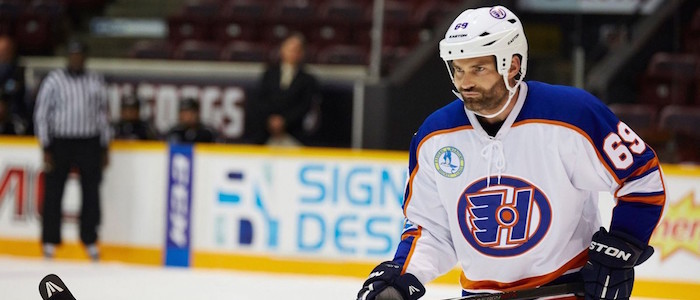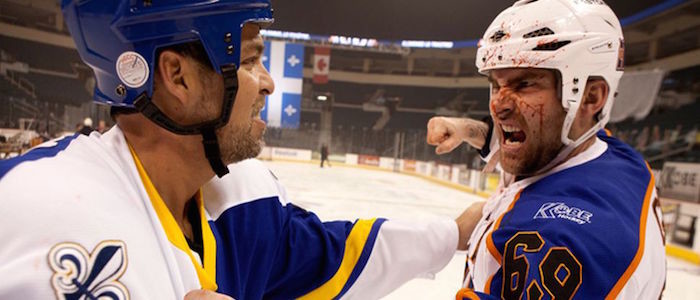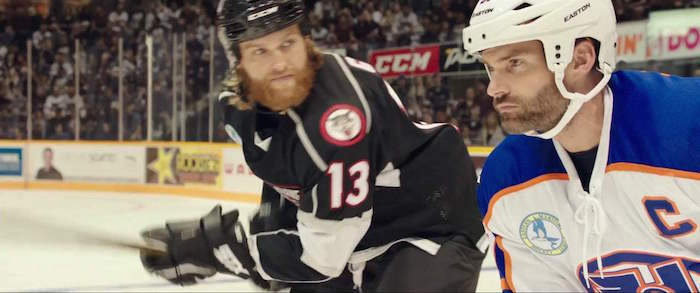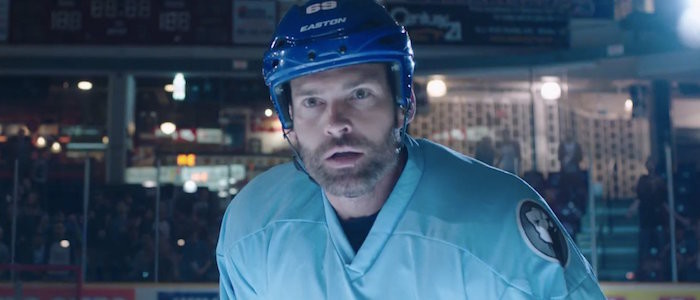The 'Goon' Movies Are The Perfect Underdog Stories For Our Time
When sports and cinema collide, there's no more exhausted formula than an underdog story. Some no-luck team or player who's either too green (inexperienced) or too gray (past prime); a journey through workout montages and tremendous sacrifice to become the film's inevitable MVP. Winners born from humble rearguard and backbreaking work – whatever makes our own proverbial mountains seem more scalable, or ambitions less unreachable. If a poverty-stricken boy from India can become an MLB ace starting pitcher, I, a daytime desk jockey, can surely secure that next promotion! Perspective is everything.
The problem is, most of these films are geared towards children. For every Major League there's a Bad News Bears and Little Giants not far behind. It makes sense, too. Children need more thematic reinforcement and lesson-teaching as maturation develops. They need to see that anything can be possible, instilling hope for the future. But adults? We define redemption differently than wide-eyed, innocent youngsters who've yet to feel life's brutal, sometimes unforgiving clutches. It's a different kind of hope we look for – and that's why Goon and its new sequel, Goon: Last of the Enforcers, are so important.
Defying the "Disney' Structure
These Seann William Scott hockey comedies blend Disney underdog structures with a story like The Replacements, where even a single win is considered defying the odds. It's not about winning the Superbowl, or more specifically to Goon or Goon: Last of the Enforcers, Canada's equivalent to the Stanley Cup. It's guys with no direction finding unlikely talents (Doug Glatt kicking ass like no one else), or veterans struggling to remain relevant (Ross "The Boss" Rhea fading away). Years of Tom Brady-like dominance aren't on the line. These films focus on personal happiness instead of conquering the world. The older you get, the more important this becomes. Kudos to a franchise like Goon for addressing grand achievement on such a "manageable" scale. Especially with calloused cynicism and a frozen bite.
Michael Dowse's Goon is as much about Doug Glatt's singular quest to embrace self-worth as it is an homage to old-school hockey machismo. Scott's titular brute goes from bouncing a Massachusetts bar to beating the snot out of opponents because it's what his team asks. Repeatedly told he's "not a hockey player," which never matters. Glatt finds purpose – violent, tooth-cracking purpose – and still retains a simplistic open-heartedness (covered in scabs and bruises). It doesn't matter how ridiculous it gets or what other people think. This is the story of a man who merely grants the Halifax Highlanders a playoff berth (we assume). End scene, because what happens next means nothing to Glatt's journey.
It's not just about finding a general purpose, but specifically finding your purpose.
The Ongoing Story
In Jay Baruchel's fan-pleasing follow up, Goon: Last of the Enforcers, Glatt is already trending downward. A young hot-shot (viking barbarian Anders Cain played by Wyatt Russell) severely injures his right arm, which leads to a life of insurance sales. Boring, tedious "document" work that inspires Glatt to have Ross Rhea teach him the art of left-handed fighting. His Halifax family needs him, and Glatt refuses to let them down. Xavier LaFlamme and Marco Belchior accept him for the poorly communicating, bare-knuckle bruiser he is. Glatt's willing to bleed one last time for Halifax, before fatherhood begins the next "safer" stage of his life (Eva's desire is to stop worrying about Doug every night in the rink). In other words, a glorious descent.
Stories like these tap the messy, motivated-by-defeat side of our human experience. They're full of the empowerment and pridefulness we instill in our offspring, yet blackened by the harsh realities that older audiences have embraced and experienced. Goon isn't afraid to physically depict the shots life doles out – Goon: Last Of The enforcers doubly so (drink every time a fighter spews blood). The greatest metaphor, literally whacking us in the face.
Rhea and Glatt are fighting for what they desire in the most literal sense, jerseys stained red and scars worn with pride. It's the hockey player's mental state. Laying there in a pool of their own mess, defeated, and when their victorious opponent asks if they're "Okay," still snapping a quick "Fuck you." They're going to get right back up and take another puck to the mouth. Or haymaker to the dome. Because that's what you do, even when your face looks like a crime scene photo. You get back up and rise to the next challenge, ready to serve your own slice of humble pie. It's this fiery passion that any one person dreams of feeling (maybe with less beatings involved).
The Meta Narrative
The casting of Seann William Scott is an underdog story itself. The foul-mouthed party boy from Dude, Where's My Car? and the sex-driven American Pie franchise is now short-worded and full of humility. It's easy to see Doug Glatt as a grown up Steve Stifler, struggling to find significance now that popularity and beer-chugging aren't considered "skills." Sick of being the obnoxious, empty frat stereotype who offended so many, he's now a pure-hearted and simple man who just wants to be taken seriously. Scott is living an understated underdog story parallel to Doug Glatt's own trajectory, and you can't help but feel both journeys emanating equally from an otherwise goofball sports comedy.
Goon is, for me, Scott's response to a drop-off in casting and missed opportunities like Southland Tales and action team-ups with The Rock that showed few new dimensions to his performance portfolio. Glatt is a punishing personal bodyguard of the nicest variety, sincere beyond regular emotional capabilities. This allows him to connect with characters like Rhea (his short-lived rival) or LaFlamme (showy teammate who turns bad blood into co-captain love) despite fiery histories. No grudges. He just shuts up and does what's needed – a comment on egotism and excuses. It's a good look for Scott, who rises with his own brand of reestablished screen value.
An Underdog Movie For 2017
It helps that both films are tremendously funny; a raunchy linemate of George Roy Hill's Slap Shot. Dowse plays juvenile laughs a bit tighter while Baruchel throws goes gloves-off, but the focus is always on Doug Glatt. Locker room banter navigates a sloppy mess of testosterone and Eastern European mom jokes (led by Kim Coates' ice-cold coach), all while Glatt shows how one passionate, unlikely man can change the lives of many. There's no such thing as too late in life, but this is more calculated than schoolyard daydreams. Ballbusting, face bashing, rock bottoms – it's the kind of underdog story that older audiences need, and Goon is a perfect example. Slap Shot for a new generation, or The Mighty Ducks with a lot more violence and talk of double-teaming Belchy's mom. Language that's way more understandable when your will and cheery optimism have been ground to the bone. R-rated and roguish for a reason.
Why are these Goon movies perfect R-rated underdog films for our time? Because of this notion that individual fulfillment and success is wholly different from one individual to another. Doug Glatt's commitment to punching rivals in the face is merely one piece of a larger, more freeing puzzle. This ability to find your own weird niche – be it ice skate brawling or, I don't know, writing tirelessly about movies on the internet – and have it mean so much. Damn the naysayers. No matter how miniscule or unimportant you feel, we're all here for a reason. Not everyone can be the next Wayne Gretzky. Sometimes you're the guy who protects him and slugs any opponent who poses a threat, and if you are, you wear that badge with pride. Goon and Goon: Last of the Enforcers understand what it means to be alive – and more importantly, shows us a damn-funny good time in the process. Don't sleep on either film for a single second, you hosers.



